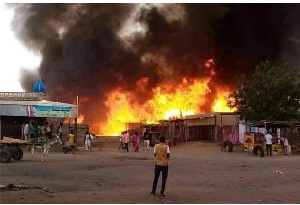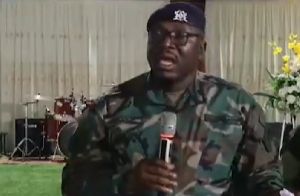The number of people dying because of the civil war in Sudan is significantly higher than previously reported, according to a new study.
More than 61,000 people have died in Khartoum state, where the fighting began last year, according to a report by the London School of Hygiene and Tropical Medicine's Sudan Research Group.
Of these, 26,000 people were killed as a direct result of the violence, it said, noting that the leading cause of death across the Sudan was preventable disease and starvation.
Many more people have died elsewhere in the country, especially in the western region of Darfur, where there have been numerous reports of atrocities and ethnic cleansing.
Aid workers say the conflict in Sudan has created the world's worst humanitarian crisis, with many thousands at risk of famine.
Until now, the UN and other aid agencies have been using the figure of 20,000 confirmed deaths.
Because of the fighting and chaos in the country, there has been no systematic recording of the number of people killed.
The study comes as a rights group says French military technology is being used in the conflict, in violation of a UN arms embargo.
Amnesty International on Thursday said the Rapid Support Forces militia, which is battling the army, was using vehicles in Darfur supplied by the United Arab Emirates that are fitted with French hardware.
"Our research shows that weaponry designed and manufactured in France is in active use on the battlefield in Sudan," said Amnesty’s Secretary General Agnès Callamard.
The BBC has asked for comment from France and the UAE, which has previously denied arming the RSF.
The Galix defence system - made in France by companies KNDS and Lacroix – is used for land forces to help counter close-range attacks.
Amnesty said the weapons could be used to commit or facilitate serious rights violations, adding that the French government must ensure the companies "immediately stop the supply of this system to the UAE".
The rights group shared images, which it said it had verified, of destroyed vehicles on the ground that had the Galix system visible on them.
It said that the UAE and France had a long-standing partnership in the defence sector and cited a parliamentary report indicating that French companies had delivered about 2.6bn euros ($2.74bn; £2.16bn) in military equipment to the UAE between 2014 and 2023.
It said the companies had a responsibility to respect human rights and to conduct "due diligence throughout their entire value chain".
Amnesty says that it had contacted the affected companies and the French authorities regarding the use of the defence system but had received no response.
"If France cannot guarantee through export controls, including end user certification, that arms will not be re-exported to Sudan, it should not authorise those transfers," it said.
The UN first imposed an arms embargo in Darfur in 2004, following allegations of ethnic cleansing against the region's non-Arabic population.
Amnesty has called for the embargo to be expanded to the rest of Sudan, and to strengthen its monitoring mechanism following the outbreak of the civil war.
Amnesty has urged all countries to stop directly and indirectly supplying arms to Sudan’s fighting factions.
The paramilitary RSF, led by general Mohamed Hamdan Daglo, has been at war with Sudan’s regular army under Abdel Fattah al-Burhan since April 2023 when the two former allies took up arms against each other in a ferocious power struggle.
The RSF has been accused of ethnic cleansing in Darfur, which it has denied, blaming local militias.
Both parties have been accused of committing war crimes, with the ongoing fighting leaving thousands dead and millions displaced.
In August, a UN-backed committee of experts declared famine conditions in parts of Darfur.
The head of the World Health Organization said starvation was "almost everywhere" following a visit to the country a month later.
"The situation in Sudan is very alarming... the massive displacement - it's now the largest in the world, and, of course, famine," director-general Tedros Adhanom Ghebreyesus then told the BBC.
The confluence of war, hunger, displacement, and disease in Sudan has however been overshadowed internationally by the wars in Ukraine and the Middle East.
The Sudan Research Group research found that 90% of the deaths in Khartoum were unrecorded, pointing to a potentially similar situation in other regions.
Mayson Dahab, the lead researcher, however said they did not have sufficient data to estimate mortality levels in other parts of the country or determine how many deaths in all could be linked to the war.
Africa News of Thursday, 14 November 2024
Source: bbc.com

















